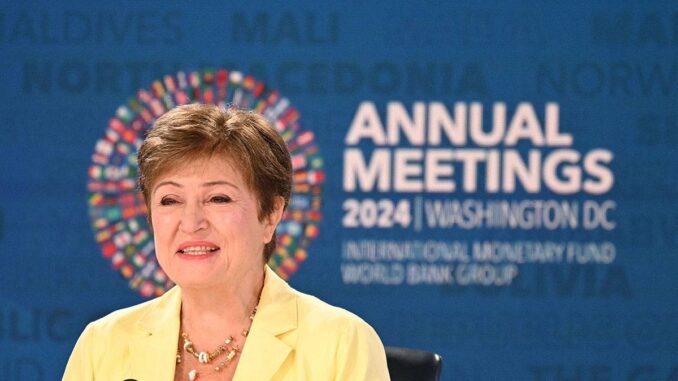
WASHINGTON, D.C. — The International Monetary Fund (IMF) wants to know more about a cross-border payments system discussed by the Brics group of countries this week and aimed at boosting non-dollar transactions, the Fund’s managing director said on Thursday.
The meeting of the Brics meaning Brazil, Russia, India, China and South Africa took place in the Russian city of Kazan at the same time as the annual meetings of the IMF and the World Bank in Washington.
The Brics group has expanded significantly since its inception in 2009, and now includes countries such as Iran, Egypt and the United Arab Emirates. Altogether, the Brics coalition accounts for a significant minority of the world’s economic output.
PROBE International Monetary Fund (IMF) Managing Director Kristalina Georgieva speaks during a briefing on the IMF’s Global Policy Agenda in Washington, D.C., on Oct. 24, 2024. Georgieva said the IMF would look into the cross-border payments initiative launched by Brics before deciding on a course of action. AFP PHOTO
At the Kazan summit, Russia secured a joint declaration encouraging the “strengthening of correspondent banking networks within Brics and enabling settlements in local currencies in line with Brics Cross-Border Payments Initiative.”
The system is designed to rival the European-headquartered Swift payments system, from which Russia was barred following its 2022 invasion of Ukraine.
Speaking to reporters at the IMF’s headquarters in Washington on Thursday, IMF Managing Director Kristalina Georgieva said the Fund wanted additional information about the proposed payments system before taking a firm stance on it.
“The idea of having a payments system [for] a group of countries is not new,” she said.
“What we need to see is more details,” she added. “What is it in this idea? How that may translate into reality? And then we will be able to assess it.”
Decline in Suez revenues
During her press conference, Georgieva said the Fund was focused on two main objectives going forward: Ensuring inflation rates return to central bank targets without spurring a deep recession; and fixing the current “low growth, high debt path” that many countries are on.
She also addressed what she called the tragedy in the Middle East, which she said was affecting both citizens and regional economies.
“Egypt is losing 70 percent of the revenues it used to collect from the Suez Canal because of the impact of the conflict,” she said, adding that the IMF had downgraded the MENA region by 0.6 percentage point since April.
Earlier this month, Egyptian President Abdel Fattah El-Sisi said the country had lost “$6-$7 billion” this year, in an apparent reference to Suez Canal revenues.
Georgieva also welcomed the progress made in helping countries facing debt crises, notably via the Global Sovereign Debt Roundtable (GSDR) forum for dialogue between creditors and countries in debt distress.
While the GSDR was helping to make the process of debt restructuring “more predictable and efficient,” there was more work to do, she said.
“We need to do more to help countries in debt distress get back on their feet faster,” she added.


Be the first to comment